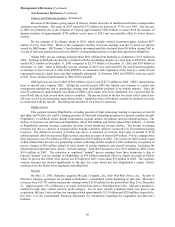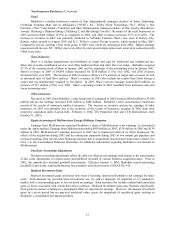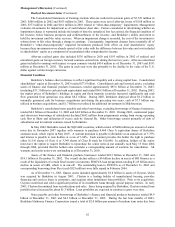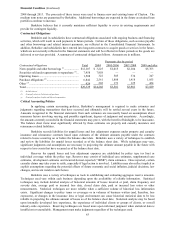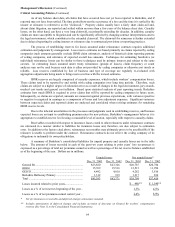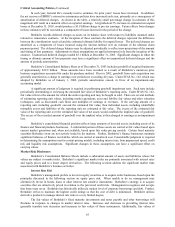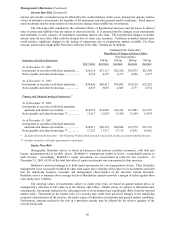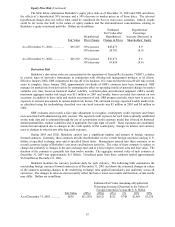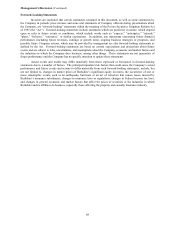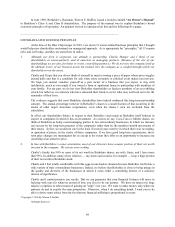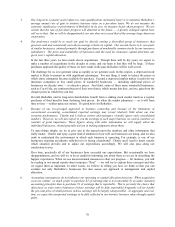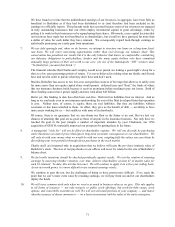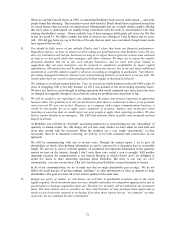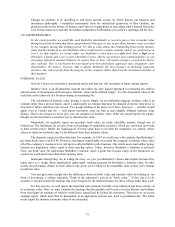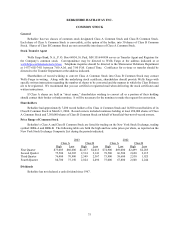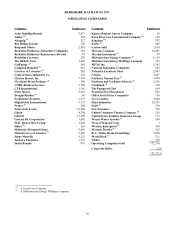Berkshire Hathaway 2003 Annual Report Download - page 71
Download and view the complete annual report
Please find page 71 of the 2003 Berkshire Hathaway annual report below. You can navigate through the pages in the report by either clicking on the pages listed below, or by using the keyword search tool below to find specific information within the annual report.70
3. Our long-term economic goal (subject to some qualifications mentioned later) is to maximize Berkshire’s
average annual rate of gain in intrinsic business value on a per-share basis. We do not measure the
economic significance or performance of Berkshire by its size; we measure by per-share progress. We are
certain that the rate of per-share progress will diminish in the future — a greatly enlarged capital base
will see to that. But we will be disappointed if our rate does not exceed that of the average large American
corporation.
4. Our preference would be to reach our goal by directly owning a diversified group of businesses that
generate cash and consistently earn above-average returns on capital. Our second choice is to own parts
of similar businesses, attained primarily through purchases of marketable common stocks by our insurance
subsidiaries. The price and availability of businesses and the need for insurance capital determine any
given year’s capital allocation.
In the last three years we have made eleven acquisitions. Though there will be dry years, we expect to
make a number of acquisitions in the decades to come, and our hope is that they will be large. If these
purchases approach the quality of those we have made in the past, Berkshire will be well served.
The challenge for us is to generate ideas as rapidly as we generate cash. In this respect, a depressed stock
market is likely to present us with significant advantages. For one thing, it tends to reduce the prices at
which entire companies become available for purchase. Second, a depressed market makes it easier for our
insurance companies to buy small pieces of wonderful businesses — including additional pieces of
businesses we already own — at attractive prices. And third, some of those same wonderful businesses,
such as Coca-Cola, are consistent buyers of their own shares, which means that they, and we, gain from the
cheaper prices at which they can buy.
Overall, Berkshire and its long-term shareholders benefit from a sinking stock market much as a regular
purchaser of food benefits from declining food prices. So when the market plummets — as it will from
time to time — neither panic nor mourn. It’ s good news for Berkshire.
5. Because of our two-pronged approach to business ownership and because of the limitations of
conventional accounting, consolidated reported earnings may reveal relatively little about our true
economic performance. Charlie and I, both as owners and managers, virtually ignore such consolidated
numbers. However, we will also report to you the earnings of each major business we control, numbers we
consider of great importance. These figures, along with other information we will supply about the
individual businesses, should generally aid you in making judgments about them.
To state things simply, we try to give you in the annual report the numbers and other information that
really matter. Charlie and I pay a great deal of attention to how well our businesses are doing, and we also
work to understand the environment in which each business is operating. For example, is one of our
businesses enjoying an industry tailwind or is it facing a headwind? Charlie and I need to know exactly
which situation prevails and to adjust our expectations accordingly. We will also pass along our
conclusions to you.
Over time, practically all of our businesses have exceeded our expectations. But occasionally we have
disappointments, and we will try to be as candid in informing you about those as we are in describing the
happier experiences. When we use unconventional measures to chart our progress — for instance, you will
be reading in our annual reports about insurance “float” — we will try to explain these concepts and why
we regard them as important. In other words, we believe in telling you how we think so that you can
evaluate not only Berkshire’ s businesses but also assess our approach to management and capital
allocation.
6. Accounting consequences do not influence our operating or capital-allocation decisions. When acquisition
costs are similar, we much prefer to purchase $2 of earnings that is not reportable by us under standard
accounting principles than to purchase $1 of earnings that is reportable. This is precisely the choice that
often faces us since entire businesses (whose earnings will be fully reportable) frequently sell for double
the pro-rata price of small portions (whose earnings will be largely unreportable). In aggregate and over
time, we expect the unreported earnings to be fully reflected in our intrinsic business value through capital
gains.


